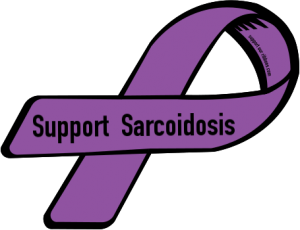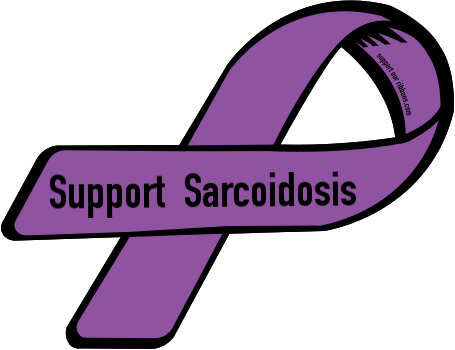 Sarcoidosis (pronounced SAR-COY-DOE-SIS) is a disease in which inflammation can occur in the lymph nodes, lungs, liver, eyes, skin, and other tissues. Sarcoidosis causes heightened immunity, which means that a person’s immune system, which normally protects the body from infection, causes damage to the body’s own tissues.
Sarcoidosis (pronounced SAR-COY-DOE-SIS) is a disease in which inflammation can occur in the lymph nodes, lungs, liver, eyes, skin, and other tissues. Sarcoidosis causes heightened immunity, which means that a person’s immune system, which normally protects the body from infection, causes damage to the body’s own tissues.
Causes and Risk Factors The cause of sarcoidosis is unknown. In sarcoidosis, tiny clumps of abnormal tissue called granulomas form in certain organs of the body. Granulomas are clusters of immune cells. The disease can affect almost any organ of the body, but it usually affects the lungs.
Possible causes of sarcoidosis include:
- Extreme immune response to infection
- High sensitivity to environmental factors
- Genetic factors
Symptoms There may be no symptoms with sarcoidosis. When symptoms do occur, they can involve almost any body part or organ system.
Almost all patients with sarcoidosis have lung or chest symptoms which include:
- Chest pain (most often behind your breast bone)
- Dry cough
- Shortness of breath
Skin symptoms of sarcoidosis patients include:
- Hair loss
- Rash
- Scars that eventually become raised or inflamed
Nervous system symptoms may include:
- Headache
- Seizures
- Weakness on one side of the face
Eye symptoms include:
- Burning
- Discharge from the eye
- Dry eyes
- Itching
- Vision loss
Treatment Sarcoidosis symptoms will often get better on their own slowly without treatment. In fact, many sarcoidosis patients are not seriously ill, and the disease can get better without treatment. About 30-50% of cases get better without treatment in 3 years, and the overall death rate from sarcoidosis is less than 5%.
Sarcoidosis patients whose eyes, heart, nervous system, or lungs are affected may need to be treated with corticosteroids. Therapy may continue for 1 or 2 years. Patients who are severely affected may need lifelong therapy.
Facts About Sarcoidosis
- Sarcoidosis is more common in African-Americans than Caucasians.
- Sarcoidosis is common in people of European, particularly Scandinavian, descent.
- The estimated lifetime risk of developing sarcoidosis in African-Americans might be as high as 2 percent.
- Females are more prone to the disease than males.
- Sarcoidosis is very rare in young children and typically begins between the ages of 20 and 40.
- A person with a close blood relative with sarcoidosis is nearly five times as likely to develop the disease.
Famous African-Americans with Sarcoidosis
- Bernie Mac (passed away in 2008)
- Reggie White (passed away in 2005)
- Angie Stone
- Tisha Campbell-Martin
- Bill Russell and daughter, Karen Russell
- Floyd Mayweather, Sr.
- Julie Brown (former MTV VJ)
- Judge Joe Brown
- Evander Holyfield
- James E. Ray (of the Denver Nuggets)
To learn more about sarcoidosis, please visit www.stopsarcoidosis.org, www.sarcoidosisfoundation.org, or www.berniemacfoundation.org






Pingback : {Sarcoidosis Treatment|How to cure sarcoidosis|Can sarcoidosis be cured|Cure for sarcoidosis|Cure sarcoidosis|How to treat sarcoidosis|Natural cure for sarcoidosis|Natural cures for sarcoidosis|Natural remedies for sarcoidosis|Natural renedy for sarcoidos
i have sarcoidosis and have been asymptomatic. Iam a black british woman living in New York who would like to assist others in their battle with this mysterious silent ailment.